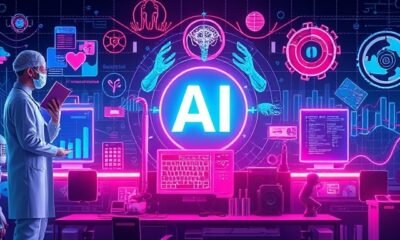Artificial Intelligence
How AI is Transforming Drug Discovery and Development
AI technology revolutionizes drug discovery through three key advancements which include accelerating development phases as well as enhancing precision medicine capabilities and revealing novel treatment opportunities. Understand the obstacles and prospects which will define pharmaceutical development through the coming years.

A world exists where pharmaceutical organizations can create necessary drugs more efficiently at a cheaper rate using precise processes. The pharmaceutical industry experiences a revolution through Artificial Intelligence (AI) which transforms how pharmaceutical products get discovered and developed.
Definition:
Drug discovery process improves through data analysis and predictive modeling together with machine learning algorithms and AI enables more efficient identification of drug candidates. The combination of these capabilities enables researchers to examine large datasets and simulate molecular behaviors and tailor clinical study designs which shortens development timelines and decreases expenses while raising the success probability.
Transformative approach both powers scientific progress and creates promising therapeutic possibilities worldwide.
What Is Drug Discovery and Development?
Modern medical success depends on discovering and developing new pharmaceutical compounds because these life-saving discoveries form the core of contemporary medicine. Physical drug development takes an excessively long time and massive costs at each developmental step while facing numerous unsuccessful trials. The entire drug development process undergoes transformation thanks to artificial intelligence (AI). Through its reshaping of drug discovery and development AI has accelerated discovery timelines while cutting costs and improving drug development outcomes.
AI technology stands at the core of a quiet revolution transforming the pharmaceutical sector.
What Are the Challenges in Traditional Drug Discovery?
Traditional drug discovery and development have been expensive, and challenging process for decades.
Cost vs. Results Battle:
Discovery of new drugs through traditional approaches brings exorbitant expenses. The development process for a new drug typically lasts 10 to 15 years at a total cost between $1–2 billion.
Time-Consuming Predictive Processes:
Scientists face substantial difficulties when they try to analyze how substances interact within complex biological human systems. Traditional testing methods result in both time and resource loss.
High Failure Rates in Clinical Trials:
Among the thousands of potential compounds used in clinical trials a small number actually pass through the testing phase. Development of 90% of pharmaceutical compounds fails either because they prove ineffective or exhibit safety issues after multiple years of development.
The shortcomings of traditional approaches demand immediate AI adoption because they demonstrate the inadequacy of current mechanisms.
AI’s Role in Drug Discovery and Development Explained:
AI is rewriting the rules of drug discovery, and here’s how:
Analyzing Big Data:
Artificial intelligence analyzes enormous medical datasets through a combination of machine learning (ML) deep learning (DL) and natural language processing (NLP). The brain-like analytical approach shortens the time needed for evaluation.
Identifying Drug Targets and Biomarkers:
The precision with which AI discovers new drug targets for genes proteins or molecules remains outstanding to me. Potential treatments begin from these identified targets.
Discovering Potential Better Molecules:
AI models perform global database scans which predict molecular behavior when exposed to particular conditions. The system provides reliable and fast performance to users.
Predicting Drug Interactions:
AI systems find drug interaction potential through their analysis of extensive databases containing information about compound reactions. AI generates predictive information to reduce drug side effects which makes new drug combinations safer before human testing occurs.
Optimizing Drug Formulation:
Through AI-powered optimization researchers can achieve their best drug formulation results by identifying optimal ingredient combinations which maximize both drug performance and stability characteristics. The use of simulation technology through AI reduces the requirement for extensive laboratory-based trial-and-error methodology.
Accelerating Preclinical Trials:
The essential nature of preclinical trials makes them also laborious in terms of their duration. Through biological response simulation AI accelerates this phase which helps researchers forecast success percentages and optimize approaches without performing tests on living subjects.
Enhancing Drug Repurposing:
The identification of new therapeutic applications for current medications using AI represents a total transformation in medical research. The analysis of molecular patterns reveals previously unknown therapeutic applications which shortens development timelines while reducing expenses.
AI in Clinical Trial Design:
The analysis of historical clinical data through AI leads to effortless trial design because it determines which patients should participate along with medication dosage regimes and trial outcome measurements. The implementation of this approach results in trials that complete faster while being more effective and achieving better success rates.
Personalizing Treatment Plans:
AI systems build customized healthcare solutions through evaluating patients’ genetic information combined with their past medical records and personal daily activities. The individualized solutions used by this approach generate treatments that work better and reduce adverse effects.
Improving Drug Safety:
AI algorithms enhance drug safety operations by detecting adverse drug reactions while simultaneously identifying vulnerable patient groups during the early stages. Drugs benefit from ongoing learning processes which enable the development of enhanced drug safety programs after reaching the market.
AI for Predictive Toxicology:
Through its predictive toxicology functions AI systems help pharmaceutical companies phase out traditional animal testing procedures. Biological response simulations through models deliver early-stage drug development information regarding toxicity levels and safety profiles.
Reducing Development Time:
The implementation of AI brings faster drug development through automated workflows and enhanced data analytics capabilities together with precise prediction algorithms. A process that needed years to complete today finishes much sooner.
AI in Drug Manufacturing:
Drug production reaches higher efficiency through AI because the technology optimizes manufacturing processes and maintains quality requirements while identifying forthcoming production breakdowns. The system optimizes workflows through automated processes that also preserves regulatory requirements.
AI for Post-market Surveillance:
AI systems track drug effects in real-world use through the analysis of real-world data after market release. Through proactive surveillance systems adverse events along with emerging patterns are detected to safeguard patient safety while preserving pharmaceutical trust.
The research duration would extend into multiple years without automation through AI systems.
Why Does Predictive Modeling Matter in Drug Discovery?
The early stages of the development process benefit from predictive modeling which delivers strong effects by providing focused options.
Using Quantitative Methods:
AI platforms leverage QSAR (Quantitative Structure-Activity Relationship) algorithms to evaluate drug effectiveness and toxicity potential before starting any testing phase.
Minimizing Failures:
The time savings in drug development come from AI selecting candidates which demonstrate high probabilities for success during clinical trials.
Side Effect Predictions:
Detecting drug side effects at an early stage minimizes unexpected results during the challenging testing period in clinical development.
Accelerating Drug Development:
AI advances drug development timelines through automated data assessment which eliminates time-intensive traditional manual work methods. The accelerated process helps reduce obstacles which stand in the way of new compound discovery and testing.
Enhancing Drug Safety:
AI tools evaluate massive datasets to identify both major and minor safety issues enabling drug agents to be safer for human testing trials to begin. The early intervention through this approach both reduces potential risks and maintains patient safety throughout drug development.
Identifying Effective Molecules:
AI algorithms search through expansive chemical databases to locate compounds which demonstrate maximum therapeutic potential thus researchers can start investigating their most promising findings.
Optimizing Dosage Levels:
Using machine learning algorithms physicians can determine precise medication dosages that deliver optimal therapeutic outcomes and reduce the chance of dangerous side effects.
Reducing Development Costs:
The combination of AI-driven efficiency enhancements with decreased candidate failure rates leads to lower development expenses which decreases drug prices and expands patient access to treatment.
Improving Clinical Trial Success Rates:
By analyzing extensive datasets AI systems can pinpoint perfect patient trial candidates and forecast treatment results leading to improved clinical success while minimizing wasted trials.
Personalized Drug Therapy:
By processing genetic information alongside lifestyle and demographic data AI systems can build customized therapeutic approaches that match individual patient requirements.
AI-Driven Drug Repurposing:
The analysis of multiple datasets with artificial intelligence reveals new therapeutic applications for existing pharmaceuticals thereby shortening the time it takes to provide needed medications to patients.
Early Toxicity Detection:
The predictive power of AI models helps researchers identify potential toxicity during drug development so they can optimize compound structures before committing major funding.
Improving Regulatory Approval Success:
Through the generation of uniform documentation across development phases AI helps organizations fulfill regulatory requirements thus improving their prospects for approval from governing authorities.
Streamlining the Research Process:
Artificial intelligence enhances drug research by optimizing the complete pipeline beginning with hypothesis formation through data analysis while directing team members toward activities that need human intervention.
Through predictive capabilities I can direct my efforts together with my resources toward the most beneficial objectives.
How Is AI Revolutionizing Personalized Medicine?
Through its operations Artificial Intelligence enables the creation of customized medical treatments that benefit users who share similar characteristics as you and me.
Tailoring Treatments to You:
The combination of genetic data analysis and artificial intelligence enables the identification of patients who will receive optimum benefit from particular medications.
Reducing Risk for Everyone:
Patients experience fewer negative drug side effects together with improved medication effectiveness thus achieving better clinical outcomes.
Personal Sub-Groups Shine:
Through its analytical capabilities AI detects smaller numbers of patients making rare disease sufferers benefit from increased medical care.
Enhancing Drug Efficacy:
Through extensive analysis of treatment data and genetic profiles combined with clinical information AI aids drug selection while enhancing their performance potential.
Predicting Treatment Responses:
Through machine learning technology AI provides doctors with predictions about patient treatment responses to enable more knowledgeable healthcare decisions and prevent unnecessary therapeutic experiments.
Customizing Dosage Plans:
Traditional standardized dosages have disappeared from modern drug therapy. The system generates individualized treatment plans using exact measurements which optimize treatment outcomes without exposing patients to excessive risks.
Detecting Genetic Predispositions:
Through genetic marker identification AI enables individuals to obtain information about their health risks which leads to early adoption of prevention strategies.
Improving Disease Prevention:
The analysis of population health data by artificial intelligence systems enables outbreak predictions followed by community-specific prevention recommendations.
Better Understanding of Rare Diseases:
AI analyzes massive datasets to reveal pattern connections between rare diseases which becomes essential for faster diagnosis and novel therapeutic approaches.
Optimizing Healthcare Resources:
AI-based predictions enable healthcare institutions to distribute resources optimally which results in clinics and hospitals becoming better equipped to serve each patient’s distinctive medical situation.
Minimizing Side Effects:
Achieving safer treatment therapies for all patients becomes possible through AI analysis which combines pharmaceutical information with patient records to enhance medication safety.
Personalized Health Monitoring:
Wearable devices equipped with artificial intelligence systems currently monitor real-time medical data which helps users gain individualized wellness feedback.
Advancing Precision Medicine:
The precision medicine revolution advances through AI systems which unify genomic data with environmental and life-style information to generate highly accurate medical directions.
Targeted Cancer Therapies:
Through its ability to detect tumor-specific molecular and genetic signatures AI enables oncologists to create targeted cancer treatments which attack cancer cells without harming healthy cells.
Building the future healthcare system that delivers better patient access represents work I find deeply meaningful.
Can AI Accelerate Drug Repurposing?
Research demonstrates surprising new therapeutic functions for previously discovered pharmaceuticals.
Recycling Old Drugs:
Through database scans AI identifies already approved drugs which may treat recently discovered diseases including the COVID-19 treatments AI rapidly identified.
A Cost-Effective Move:
The use of previously approved drugs for new purposes saves both public resources and shortens approval times since the drugs have already proven their safety measures.
Identifying Unlikely Treatments:
Through its advanced pattern recognition abilities Artificial Intelligence detects medical relationships that human experts miss. Through checking extensive data collections AI discovers unique disease treatments which create fresh possibilities for patients who have few treatment choices.
Expedited Drug Approval:
The combination of AI technology for trial design optimization and accelerated result analysis enables regulatory bodies to approve new drugs more rapidly. The new method speeds up the delivery of crucial lifesaving medicines to the market.
Overcoming Drug Development Challenges:
The high rate of drug development failures becomes more manageable with predictive modeling from AI systems which detects potential problems before expensive delays occur.
Enhancing Drug Discovery Efficiency:
UNSDCO’s data handling strength accelerates drug discovery by decreasing both the time needed and research expenses thus achieving quicker and more efficient compound development.
Leveraging Existing Data for New Uses:
AI analyzes available clinical trial data and patient records to reveal fresh uses for established medications thus redeeming underutilized medications.
Reducing Time to Market:
AI optimization of drug development processes decreases research-to-market timelines allowing patients to get care through a faster path than conventional methods would allow.
Expanding Drug Application Spectrum:
Through biological interaction analysis AI algorithms help scientists find alternative treatment applications for existing drugs that extend their therapeutic scope.
Improving Public Health Response:
The agility and life-saving capabilities of public health initiatives receive AI-powered support for rapid drug discovery combined with accelerated deployment during health emergencies particularly pandemics.
Reducing Research and Development Costs:
Through its precise operations AI reduces experimental attempts thereby decreasing pharmaceutical industry costs for research and development.
Discovering Hidden Potentials:
Deep learning processes enable AI to discover previously unknown value in rejected compounds which it transforms into new therapeutic options.
Speeding Up Drug Testing:
AI accelerates the preclinical and clinical trial process by both forecasting experimental results and optimizing test participant selection to provide researchers with faster results.
Creativity combines with practicality to generate resourceful solutions.
How Does AI Optimize Clinical Trials?
Clinical trials typically last an extended period while being both costly and lacking in prediction capability. AI fixes that!
Finding Trial Candidates:
System provides genomic and phenotypic analytics to determine optimal test subject selection.
Real-Time Monitoring:
Modern analytics technology enables the tracking of patient responses at levels never achieved before.
Predictive Outcome Metrics:
Through AI technology trials can be evaluated in advance to determine investment worthiness and stop prospective failures from occurring.
Improving Patient Selection:
Through patient record assessment and genetic data combined with lifestyle factor evaluation AI finds optimal participants for trials that use targeted candidates.
Enhancing Trial Efficiency:
AI automation of data collection and analysis creates an efficient process that minimizes redundancies thus accelerating trial duration and improving organization.
Reducing Costs:
Through AI technology clinical research achieves cost reduction by both cutting waste from unproductive tests and allocating resources efficiently.
Accelerating Trial Timelines:
AI-powered automation together with swift data processing now shortens trial durations from years to months.
Personalized Treatment Plans:
Through the evaluation of individual medical records and genetic information AI generates personalized treatment plans which improve therapy outcomes.
Monitoring Adverse Effects:
AI systems use continuous patient data evaluation for early detection of adverse reactions which promotes safety throughout clinical trial procedures.
Data-Driven Insights:
AI reveals previously undetectable relationships between vast data points to generate substantiated insights which steer decisions from start to finish of the trial.
Optimizing Trial Design:
Predictive modeling and simulation powered by AI enables researchers to create trials that operate with enhanced efficiency and deliver better results.
Forecasting Success Rates:
The combination of historical trial data with machine learning techniques enables AI to forecast trial outcomes thereby helping researchers make better resource decisions.
Minimizing Risks:
AI systems scan for emerging risks which allows researchers to switch strategies in order to protect patient health.
AI systems deliver the same trial outcomes within half the time span according to their promising capabilities.
How Automation Speeds Up Data Management in Drug Development?
AI saves time by automating repetitive tasks in everyday workflows like these:
- Organizing datasets and cleaning up inconsistencies.
- Streamlining laboratory research documentation.
- Accelerating internal reviews of critical findings.
The result? Pharmaceutical stages benefit from both maximum operational efficiency and reduced human mistakes.
What Are Real-Life Success Stories from AI in Drug Discovery?
Numerous successful AI applications exist in such large numbers that they inspire countless people.
- AI discovered cancer drug candidates with significant potential, saving years of development time.
- AI proved critical during the fast-tracked COVID-19 vaccine developments.
- Several rare diseases—once ignored—now have promising treatments approaching FDA approvals.
I am constantly impressed by the way breakthroughs transform hope into actual achievements.
Ethical Challenges and Limitations for AI in Pharma:
I wholeheartedly support AI advancements yet fully acknowledge the upcoming obstacles that might arise.
Privacy and Ethics:
Patient data security protection against unintended use needs to be the most vital concern.
Algorithmic Bias:
AI systems generate results that reflect the biases of their programers.
Regulation Isn’t There Yet:
The FDA together with other health agencies require more structured guidelines to approve pharmaceutical products which use artificial intelligence systems.
Data Security Concerns:
AI systems require enormous data streams yet any security breach would lead to the unprotected disclosure of patient confidential data. Implementing powerful security protocols represents an essential requirement for protecting against unauthorized access while reducing exploitation risks.
Bias in AI Training:
The training data that AI systems receive contains societal biases that cause their outputs to become inaccurate and unfair. The elimination of these biases depends on both inclusive datasets and continuous monitoring throughout development.
Ensuring Fair Access:
Pharmaceutical AI systems should be developed to prevent exacerbating already present healthcare inequalities. All groups need equal access to technological advancements regardless of their location or financial situation or personal background.
Lack of Clear Guidelines:
The rapid pace of AI innovation outstrips the creation of standardized guidelines across pharmaceutical applications. The absence of clear guidelines generates confusion between developers along with health professionals who work with them.
Need for Regulatory Oversight:
The pharma industry needs thorough examination to confirm both the secure nature and useful character of AI implementations. Regulatory institutions need to build regulatory systems which provide both hard guidelines and dynamic capabilities across advancing technologies.
Protecting Patient Rights:
Medical patients need complete ownership of their healthcare information alongside independent authority to determine how AI programs can utilize this data. All patient rights require absolute transparency along with consent procedures to operate lawfully.
Ethical AI Deployment:
AI systems need careful implementation to serve patients effectively instead of achieving profit gains exclusively. The implementation of AI demands that ethical considerations become integral at every point of the process.
Transparency in Algorithms:
AI requires transparency in decision-making systems as a necessary condition for gaining public trust. Healthcare professionals alongside stakeholders need to understand results from algorithms so they can validate their outcomes through clear and transparent design.
Data Ownership Issues:
The pharmaceutical industry needs definitive standards to determine who controls the data that AI gathers as well as utilizes. The resolution of these issues creates opportunities to build patient trust and implement data use responsibly.
Companies which implement regulation and accountability systems now will build trust that continues to grow throughout future periods.
Why AI’s Future in Drug Development Looks Promising?
Computer systems will continue to develop while absorbing adjacent technologies as part of their total integration.
AI in Precision Oncology:
Artificial intelligence technology now enables superior cancer subtype identification in the field of oncology. AI utilizations of massive datasets enable scientists to foresee tumor actions and tailor individualized treatments while identifying cancer-related genetic alterations which speeds up research into targeted therapeutic developments.
Synergy Between AI and Genome Editing:
AI technology unites with CRISPR to advance genetic medicine through research at its modern frontier. AI algorithms identify optimal genetic modifications through their predictive analysis to minimize off-target effects producing safer and more efficient editing for patients requiring personalized treatment.
Revolutionizing Drug Discovery:
AI technology is reducing drug discovery timelines from typical developmental cycles that span ten years. AI simulations combined with predictive models help researchers discover promising drug candidates which decreases both the costs and improves the success rates of clinical trial evaluations.
AI’s Role in Advanced Treatments:
AI systems develop leading treatments through their ability to create adaptive medicine approaches and implement real-time clinical decisions. The usage of AI tools in medical treatment results in both precise drug dosing and robotic surgery which leads to improved management of complex health conditions.
Big Data and Medicine:
The complete synergy exists between big data operations and AI. Through analyzing extensive medical databases containing patient information alongside clinical research data AI provides strategic understanding that accelerates diagnosis while improving treatment results and revealing subtle patterns undetectable by human perception.
Enhancing Treatment Precision:
Modern healthcare stands on the foundation of personalized medicine while AI functions as its fundamental building block. By examining individual patient information including genetic data alongside wearable device metrics AI delivers personalized treatment solutions which yield better results and reduce adverse effects.
AI-Powered Drug Development:
Artificial Intelligence drives fundamental changes in pharmaceutical research through molecular structure evaluation and drug interaction modeling and optimal drug candidate selection. The speed of new medicine development through this approach allows faster delivery of treatments while showing promise to treat diseases that previously had no cure.
The disruption opportunity in front of us has just started to evolve and I am honored to see this transformation take place right before my eyes.
Conclusion:
Pharmaceutical use of artificial intelligence serves as a transformative force which advances drug development alongside precision medicine applications. The complete realization of AI potential in pharmaceuticals faces important hurdles which need to be resolved first. We can protect the responsible and ethical implementation of AI in pharmaceuticals through dedicated action toward addressing algorithmic bias while securing data and establishing guidelines and preserving patient rights.
Do you need clarification about particular advancements or predictions within AI? Share your thoughts below. I’m happy to respond!
-

 Artificial Intelligence8 months ago
Artificial Intelligence8 months agoWhat is Artificial Intelligence? A Comprehensive Guide for Businesses and Enthusiasts
-

 Artificial Intelligence6 months ago
Artificial Intelligence6 months agoHow to Use Grok AI: A Complete Guide
-

 Artificial Intelligence8 months ago
Artificial Intelligence8 months agoUnlocking the Power of Artificial Intelligence Tools
-

 Artificial Intelligence7 months ago
Artificial Intelligence7 months agoWhat is DeepSeek? Revolutionizing AI with Cutting-Edge Solutions
-

 Artificial Intelligence3 months ago
Artificial Intelligence3 months agoAI Technologies in Warehouse Automation:
-

 Artificial Intelligence4 months ago
Artificial Intelligence4 months agoMeta’s AI Push: The Standalone Assistant App Set to Rival ChatGPT
-

 Artificial Intelligence3 months ago
Artificial Intelligence3 months agoHow Artificial Intelligence is Revolutionizing Logistics:
-

 Artificial Intelligence3 months ago
Artificial Intelligence3 months agoPredictive Analytics for Demand Forecasting:


